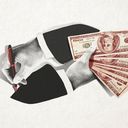Corporate capture of government regulators is corrupting laissez-faire

Published Date: 4/21/2019
Source: axios.com
Laissez-faire capitalism works very well in theory. The government sets clearly-defined rules, within which corporations compete for profits. Companies win by providing the best products at the lowest price; investors win by allocating scarce capital where it can be put to best use; the country as a whole reaps the benefit. In an age of corruption anxiety, however, laissez-faire often means that companies themselves get to set the rules.The Consumer Financial Protection Bureau has lost all its teeth, as Nicholas Confessore reports in today's NYT Magazine. The agency was created to work for and be answerable to consumers, but then Mick Mulvaney took over, and now it seems to answer mostly to payday lenders.The CFPB's new head, hand-picked by Mulvaney, is Kathleen Kraninger. (Mulvaney himself has moved up to become the White House chief of staff.) Kraninger's first big speech this week was described as "the latest nail in the coffin of the CFPB" by LA Times consumer advocate David Lazarus. Kraninger referred 11 times to "stakeholders", including "a continued commitment to engagement with all of our stakeholders". Those stakeholders emphatically include financial institutions, who don't need to worry about being sued: the CFPB's rules "are not best articulated on a case-by-case basis through enforcement actions," says the agency's new head.A group of payday lenders called NDG Enterprise illegally threatened borrowers with arrest and imprisonment, per Confessore. The CFPB recently settled its three-year prosecution of NDG; the fine was exactly $0.The big picture: When corporations capture their regulators, laissez-faire fails. Driving the news: Corporations must not be allowed to influence bankruptcy proceedings without fully revealing their conflicts. But that's exactly what McKinsey is being accused of. Now, McKinsey itself has been given the job of drawing up new conflict-of-interest guidelines — guidelines that "could serve as a model for all bankruptcy practitioners". A spokeswoman for McKinsey told the WSJ that the firm is looking to address "ambiguities" in the existing rules.Corporations literally write laws now. An investigation by USA Today, The Arizona Republic, and the Center for Public Integrity found at least 10,000 bills drafted by corporate interests being introduced in the past 8 years, of which more than 2,100 were signed into law. Why it matters: Regulatory stakes are high, sometimes life-and-death. Ali Bahrami, for example, the top safety regulator at the FAA, got that job after previously urging the agency to allow Boeing to self-certify the safety of it jets. (Boeing is back in the news this weekend, with a report of safety lapses at its North Carolina Dreamliner factory.) More insidiously, corporate capture of the government apparatus reduces faith in all institutions. Go deeper: Michael Lewis's new podcast, Against The Rules, is all about the ways in which referees are no longer trusted. Episode 2 dives into the CFPB.